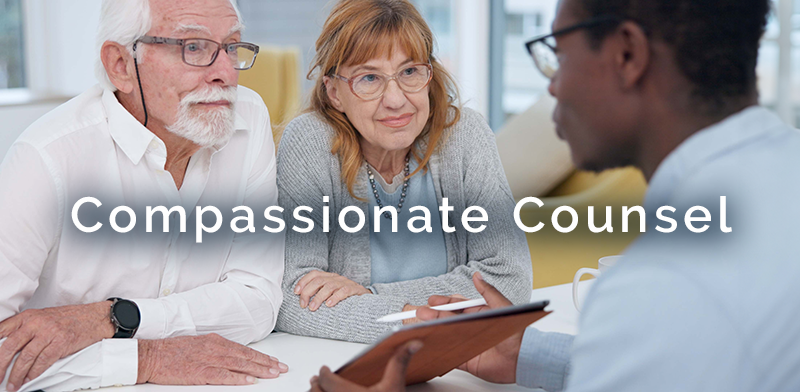
Advice for Estate Planning Attorneys from a Hospice Social Worker
By Rosie Gaston, MSW, LICSW, APHSW-C
I recently attended a community education class on estate planning. There were numerous experts speaking on topics such as financial planning, wills and trusts, financial power of attorney, and so forth. As the session was ending, the attorney who was presenting stated, “Now we need to talk about health care directives. I always save this for last as people have the hardest time with this task.”
As I looked around the room, I could see heads shaking and felt a sense of discomfort. Compassion rushed over me for estate planning attorneys as I recognized that they witness these reactions, hesitations, uncertainty, fear, and grief regularly in working with their clients. Attorneys are trained to navigate the complexities of the law and guide their clients in legal matters, but do they ever get education on how to best handle the emotional aspects of end-of-life planning for their clients?
Death Anxiety
Death anxiety is an emotional reaction, such as fear, anxiety, worry, regret, or dread, in response to the awareness, anticipation, or threat of one's mortality. Much of the research suggests this is a universal and common experience influenced by our culture, religious and spiritual beliefs, life experiences, and stage of development.
Death anxiety is a conscious and subconscious experience. It can be activated by challenging life events such as illness, divorce, death of a loved one, and exposure to death or traumatic experiences. Along with timeline events such as reunions, retirements, and—you guessed it—estate planning. Feeling uneasy is a normal and expected response when someone is preparing for a world in which they no longer exist. It can be even more challenging when we are reflecting on detailed wishes for our final days, hours, and minutes of our lives.
Steps to Support Clients
Witnessing clients’ death anxiety is an understandably challenging part of an estate attorney’s work. After all, you aren’t therapists! There are, however, simple steps anyone can take to support clients in this space.
Awareness and Preparation
Understanding that reflecting on and writing out one's values, wishes, and goals for the end of their life is emotionally challenging for a majority of the population can change the way we approach the topic. This task can be introduced with tenderness, acknowledging that this can be heavy. Example: While leaning forward, making direct eye contact, and in a gentle tone of voice “Our next task is to complete your health care directive. I recognize that this may be the hardest aspect of our work together and I’m here to support you the best I can.”
Active Listening and Reflection
It’s common for people to reflect on their experiences with death and dying while completing a health care directive. I coach new social workers to count to five in their head before responding in emotionally charged situations. This ensures that the individual has finished expressing their thoughts and gives you a bit of time to formulate a thoughtful response. They aren’t looking for you to fix, educate, or share some brilliant epiphany to solve their grief or fears. So, don’t try.
Lean Into Empathy
My go-tos are validating and normalizing experiences and truths. Example: “I’m hearing that you love (always use present tense here) your mom very much and her death is still something that is very hard for you.” “A majority of people have a hard time thinking about and planning for their end of life, you are not alone.” You can also use empathetic responses to redirect back to the task at hand. Example: “It sounds like being your mom's health care agent had its challenges while also felt rewarding to you. Who in your life do you think could handle these common challenges, while also find meaning in being your advocate?”
Provide Resources
Some aspects of creating a healthcare directive are outside of your scope of practice. You are an attorney, after all, not a health care professional. Encourage your clients to bring questions to their medical provider. Some health care systems have an advance care planning team to help people complete medically detailed health care directives. You can also provide your clients with information on different medical treatments; Honoring Choices Minnesota has great handouts.
Connect your clients with A Better Ending LLC to facilitate these courageous conversations and identify their goals, wishes and values that can be added to their health care directive. For clients presenting with significant anxiety, you can recommend mental health professionals who specialize in grief counseling, trauma, or existential therapy.
Finally, The Death Deck is a game for families that helps elicit preferences about end-of-life. This light-hearted approach can bring some levity to the heavy conversation.
Empower Clients
Talking about end-of-life wishes can be very challenging and it's worth it! They may need to be inspired by the benefits. Example: “Completing a detailed health care directive helps ensure that you stay in control, gives your medical team clear direction, and takes a tremendous burden off of those you love the most.”
Addressing Your Own Death Anxiety
Now that you have some tools for working with your clients, let’s focus on your own death anxiety. We all have it to some degree; death anxiety is brought into our consciousness when we are exposed to the activating events mentioned earlier. Therefore, an estate attorney's death anxiety may be closer to the surface than others who don’t support individuals in end-of-life matters.
There has been a lot of research that analyzes healthcare professionals' death anxiety and how it impacts their practice, from discussing prognosis to providing bedside care, experiencing burnout, and more. Much of the research suggests that the higher death anxiety is, the greater impact it has on practice.
There is hope for all of us that work in this space as there are coping mechanisms and interventions we can do to work on our own. Exposure therapy is a very common and effective modality that we can do outside of a therapist’s office. This can look like reading books about death and dying, visiting loved ones who are at the end of life and attending their funerals, following guided meditations that focus on life and death, and engaging in your own advance care planning where you reflect in detail on your wishes and values.
Implementing a gratitude practice such as starting your day writing down three specific things you are grateful for can provide a sense of a life well lived. Engaging in relaxation techniques such as deep breathing can help calm anxiety. It’s common to see me taking a few deep breaths before walking into a room where I am supporting people in end-of-life matters. My go-to is 4 (inhale) - 7 (hold)- 8 (exhale) as that pattern engages the nervous system and tells it I am ok.
Identify a few people in your professional circle that you can process emotionally intense situations with. It can be easy to feel a sense of helplessness. Reflect on questions like: What did I have control over? What did I do that I was proud of? Did I maintain my boundaries? Attending trainings on end-of-life topics that are relevant to your personal growth needs and professional practice can increase your confidence and promote deep introspection.
Lastly, therapists can help us process and heal on a much deeper level than we can do on our own. Sometimes this is needed and there is no shame in that. The better we can understand ourselves, the better we can show up for those we serve.
Thank you
I am so incredibly grateful to you all and the important work you do in our community. I have seen firsthand the peace of mind that my patients have had when they have solid estate plans with an attorney they trust. My hope is this article and resource list serves as a token of my gratitude and supports ongoing personal and professional growth as you navigate the profound emotional challenges associated with end-of-life planning.

Rosie Gaston MSW, LICSW, APHSW-C is a passionate and energetic social worker with over a decade of experience dedicated to guiding individuals, families, communities, and fellow professionals through the intricate journey of end-of-life care. Her path began as a hospice volunteer, igniting her pursuit of a Master’s of Social Work from the University of St Thomas and St Catherine University School of Social Work. Throughout her career, Rosie has worked alongside exceptional interdisciplinary teams in diverse healthcare settings, specializing in oncology, palliative care, and hospice. She has also made significant contributions to the field through research and presentations at both local and national levels. In 2022, Rosie established "A Better Ending" to guide and empower people to create an end-of-life plan that honors their life and to educate the community and professionals on end-of-life matters.
Photo Credit: Angela Divine
Further Reading:
Advance Care Planning Resources
Books
When Breath Becomes Air by Paul Kalanithi
Being Mortal by Atul Gawande
Can't We Talk about Something More Pleasant? by Roz Chast
The Last Lecture by Randy Pausch
Gratitude by Oliver Sacks
Death Bed Meditation
Therapists
Psychology Today has an online registry of therapists where they can be filtered out by specialty, location, insurance provider, and so forth: https://www.psychologytoday.com/us
Trainings